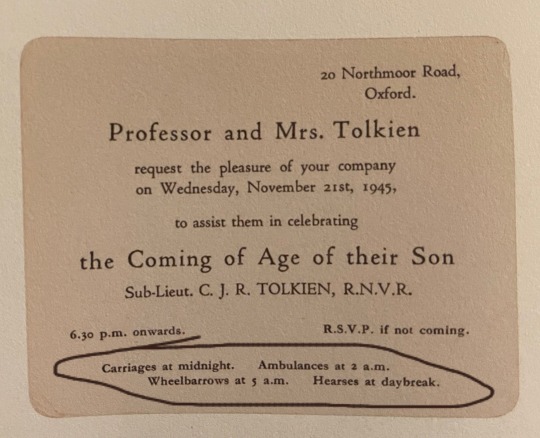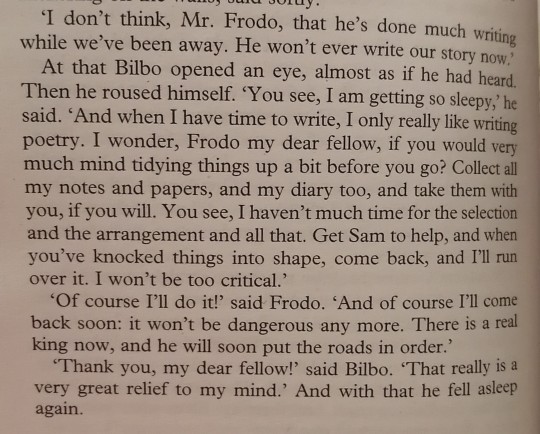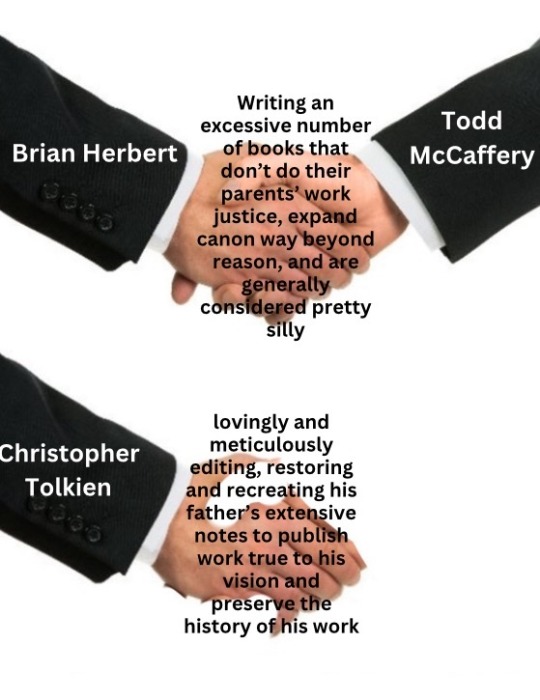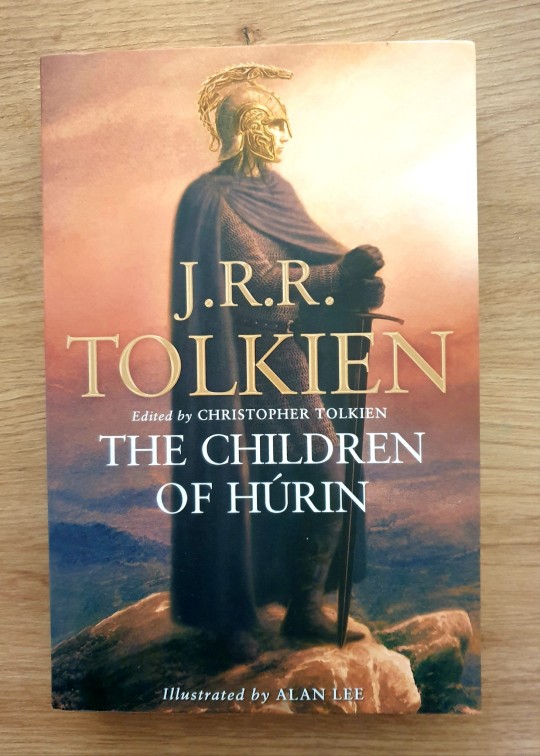#christopher tolkien
Text

"our son made it through the war to come of age, let's fucken party! rsvp only if you're a little bitch who's NOT coming. all y'all not dead of alcohol poisoning by morning (lmao losers) get dunkt on"
edit: fascinating! the tags are full of two types of people. 1) people who think this is a joke and 2) catholics who fully admit to a bit of cheeky cultural alcoholism just nodding and saying "uh huh"
63K notes
·
View notes
Text
nothing, just tolkien originally writing down the hobbit because his son christopher kept complaining that he'd change the details from night to night and then christopher later being so crucial in taking tolkien's notes and turning them into fully written novels of worldbuilding. loving someone to the point of creation and then having them help you finish the job.
#tolkien#lotr#lord of the rings#the hobbit#christopher tolkien#love#poetry#middle earth#the inklings#random thought#the silmarillion#bilbo baggins#frodo baggins#sam gamgee#legolas#gimli#aragorn#text post#textpost#shitpost#tumblr#humour#relatable#humor#lmao#funny#in my feels
2K notes
·
View notes
Text

Reading this in Lord of the Rings and knowing how silmarillion got to be printed is an experience.
#lord of the rings#lotr#silmarillion#tolkien#frodo baggins#bilbo baggins#j r r tolkien#christopher tolkien
1K notes
·
View notes
Text

vote yes if you have finished the entire book.
vote no if you have not finished the entire book.
(faq · submit a book)
450 notes
·
View notes
Text
I've been thinking about tolkien lately, and i know this must've happened to many fathers and mothers across europe in the 1940s, but
do you ever think about how tolkien was sent to fight in a pointless, brutal, terrible war, from which only he and one of his friends returned? a war that promised young british men that they would find glory, only to find death and trauma and suffering? and when he returned, stricken with trench fever, he told his children stories of the adventures of a humble hobbit - a simple tale, that maybe purposefully didn't reflect just how awful his own "adventure" was.
And then just 20 years later, those children, his children who had heard those stories of a humble hobbit, got sent to fight in another brutal, devastating war, and he had to watch them go without him, knowing what they would go through because it had happened to him.
and this time, after that second war was over, and his sons had returned to him safely, he wrote another tale. This one not as simple. This one not for children, but for the grown men and soldiers his sons had been forced to become. This one centered the brutalities of war but also the hope of friendship and love.
i just. do you ever think about john ronald reuel tolkien???
#getting emotional in this chili's#tolkien#j.r.r. tolkien#christopher tolkien#lotr#the hobbit#rant#mine#i think christopher and michael were JRRT's 2 children who served during WWII#i think priscilla was too young to be in the nurse corp but could be wrong!!#creative shit
6K notes
·
View notes
Text
Agarwaen, son of Úmarth [ TURIN ]
THE CHILDREN OF HURIN cover edition


#silmarillion#tolkien#artmirka#fantasy art#children of hurin#turin turambar#silm art#tolkien art#tolkien fanart#prince of Dor-lómin#book cover#book illustration#tolkien tag#jrr tolkien#christopher tolkien
280 notes
·
View notes
Text
It's been at least a month, but I haven't gotten over the discovery, in Christopher Tolkien's books on the writing of LORD OF THE RINGS, that until fairly late in the initial draft, Aragorn's Ranger nickname was not Strider but TROTTER.
#books#lord of the rings#lotr#aragorn#jrr tolkien#christopher tolkien#frodo was also called bingo for quite a while
26 notes
·
View notes
Text

Yeah
#dune#dragonriders of pern#lord of the rings#frank herbert#brian herbert#anne mccaffery#todd mccaffery#jrr tolkein#christopher tolkien#the silmarillion#the history of middle earth#dune sequels#brian herbert dune#crossover#pern
51 notes
·
View notes
Text

Currently Reading
The Children of Hurin
By J.R.R. Tolkien
I've read (and love) The Hobbit and The Lord of the Rings, but I've never read any of Tolkien's other material.
This was a lovely gift that I received for Christmas, from an old friend who shares my love for LotR and sat alongside me when those films first graced cinema screens.
I'm looking forward to delving into Tolkien's fantasy world once again.
#the children of húrin#JRR Tolkien#Christopher Tolkien#Books#Booklr#Currently Reading#literature#LOTR#The Hobbit#Lord of the Rings#J.R.R. Tolkien
21 notes
·
View notes
Text
I just love this bit of Christopher Tolkien's commentary on Tolkien's last version of the Quenta Silmarillion. It summarises beautifully exactly what makes it, and the published text that draws from it, so very enthralling:
... in the Quenta Silmarillion, [my father] perfected that characteristic tone, melodious, grave, elegiac, burdened with a sense of loss and distance in time, which resides partly, as I believe, in the literary fact that he was drawing down into a brief compendious history what he could also see in far more detailed, immediate, and dramatic form.
History of Middle-earth Vol. XI: The War of the Jewels, p. 245
134 notes
·
View notes
Text

Happy Posthumous Birthday Christopher John Reuel Tolkien (1924 - 2020), who is the third & youngest son of the author J.R.R. Tolkien (1892-1973), as well as the editor of much of his father's posthumously published work. He drew the original maps for his father's #TheLordOfTheRings books, which he signed as C.J.R.T.
From a child, Christopher Tolkien had long been part of the critical audience for his father's fiction, such as listening to his father’s tales of Bilbo Baggins, which were published as #TheHobbit. As a teenager and young adult, he offered a lot of feedback on “The Lord of the Rings” during its 15-year development. He also had the task of interpreting his father's sometimes self-contradictory maps of Middle-earth in order to produce the versions that were used in the books. He re-drew the main map in the late 1970’s to clarify the lettering and correct some errors and omissions.
J.R.R. Tolkien had written a large amount of material connected to the Middle-earth legendarium that was not published during his lifetime. He had originally intended to publish #TheSilmarillion along with “The Lord of the Rings”, and parts of it were in a finished state when he died in 1973; but the project was incomplete.
Once referring to his son Christopher as his "chief critic and collaborator", J.R.R. Tolkien had named Christopher his literary executor in his will. With this authority, Christopher organized the masses of his father's unpublished writings, some of which had been written on odd scraps of paper a half-century earlier. Much of the material was handwritten. Complicating matters, his father would sometimes write a newer draft over a half-erased first draft. Also, it was not uncommon for the names of characters routinely changing between the beginning and ending of the same draft.
Christopher worked on the manuscripts and was able to produce an edition of “The Silmarillion” for publication in 1977. His assistant for part of the work was Guy Gavriel Kay, who became a noted fantasy author himself.
“The Silmarillion” was followed by “Unfinished Tales” in 1980 and “The History of Middle-earth” in 12 volumes between 1983 and 1996. Most of the original source-texts have been made public from which “The Silmarillion” was constructed.
In April 2007, Christopher Tolkien published “The Children of Húrin”, whose story his father had brought to a relatively complete stage between 1951 and 1957 before abandoning it. This was one of J.R.R. Tolkien's earliest stories. Its first version dated back to 1918, and several versions were published in “The Silmarillion”, “Unfinished Tales”, and “The History of Middle-earth”.
“The Children of Húrin” is a synthesis of these and other sources. “Beren and Lúthien” is an editorial work and was published as a stand-alone book in 2017. The next year, “The Fall of Gondolin” was published also as an editorial work. “The Children of Húrin”, “Beren and Lúthien”, and “The Fall of Gondolin” make up the three "Great Tales" of the Elder Days, which J.R.R. Tolkien considered to be the biggest stories of the First Age.
Christopher served as chairman of the Tolkien Estate, Ltd., which was the entity formed to handle the business side of his father's literary legacy. He also served as a trustee of the Tolkien Charitable Trust until his retirement in 2018.
In 2001, Christopher expressed doubts over “The Lord of the Rings” film trilogy that was directed by Peter Jackson. He questioned the viability of a film interpretation that retained the essence of the work, but stressed that this was just his opinion. In 2008, he commenced legal proceedings against New Line Cinema, which he claimed owed his family £80 million in unpaid royalties. In September, 2009, he and New Line reached an undisclosed settlement. He also withdrew his legal objection to “The Hobbit” films. But, in a 2012 interview with “Le Monde”, he criticised the films saying, "They gutted the book, making an action film for 15 to 25-year-olds."
#jrr tolkien#silmarillion#the hobbit#the fall of gondolin#christopher tolkien#beren and luthien#children of hurin#lord of the rings#lotr#middle earth
22 notes
·
View notes
Text
Y’All Should Actually Read Barthes (Or: Why Your ‘Rings Of Power’ Critique Is Bad)

I think what really gets under my skin about the many, many lousy critiques about Rings of Power[1] on Tumblr dot Com and Reddit[2] that I see out there is that, firstly, they frequently seem to come from people who don’t seem to realize that their understanding and memories about Tolkien are shaped far, far, far more by the Peter Jackson movies (which were hardly ‘canon-compliant’) than they are by the original text. Second and more crucially, I think, is that everyone really wants to get pissed about canon that Tolkien never actually codified. Here’s what I mean:
Tolkien didn’t ‘write’ the Silmarillion. He wrote a whole bunch of essays, letters, notes, scraps of ideas, poems, plot outlines, and ramblings, some of which he earmarked for a project he one day planned to compile as something called The Silmarillion.
Then he made a slight error in his scheme by dropping dead.
So his son Christopher Tolkien and his pal Guy Gavriel Kay stared at this enormous pile of stuff that went back decades, pulled out some of the bits they thought were most polished, did their best to link them into some kind of narrative, edited the crap out of it, added punctuation, and published a book they called The Silmarillion after JRR’s planned, but never completed idea.
And was what was in The Silmarillion everything JRR planned to be in the final volume? Not necessarily. In many cases, not remotely, but Christopher Tolkien and Kay tried to take the stuff that was most polished, even if it was thirty year old material that Tolkien had changed his mind fifteen more times on, because the old stuff often had a clarity of completion that the later revisions did not. They usually took the stuff that complete sentences over the stuff with sentence fragments, even if the latter was more ‘fresh.’ Because they realized that The Silmarillion was more a simulacrum of Tolkien’s ideas than anything definitive, Christopher then put out The Unfinished Tales, which contained some more of Tolkien’s ideas: spme that had made it in other versions into The Silmarillion, some that had not. And since the very large pile of notes and scribblings and essays and letters and old recipes didn’t seem any noticeably smaller, he then spent thirteen years publishing The History of Middle Earth, comedically large tomes stuffed to the brim with Tolkien ideas, variations, variants, and late night side-table Kleenex notes. And then they kept putting out more books. And more. And then Christopher made the same silly mistake of dropping dead too! But other people put out even more books, with even more untouched material. There’s a new book coming out in November and JRR Tolkien’s been dead for fifty years!
None of this was published under JRR’s aegis. And let me tell you, JRR Tolkien had a pretty weighty aegis: the man was famous for berating his publishers for edits and corrections. Part of the reason he never got around to completing a definitive Silmarillion was the fact that the man never wanted to publish something with which was not completely satisfied. Everything that has come out after his death, compiled with all the love and care in the world, is nevertheless pretty damning evidence that Tolkien was rarely satisfied.
What we know about old JRR is that he changed his mind again and again, and we can’t know that on his death bed, his last thought wasn’t some brilliant revelation that finally made the One Ring work in the context of Sauron’s timeline in the Second Age. If he did, he didn’t get a chance scribble it on a napkin for his son to later try and make sense of. And so we will never really know what his true canon decision on, say, elven pregnancy was: sometimes he thought it should take about 108 years. Sometimes only 9 years. He would change his mind, or change his math, again and again..
So when you talk about the ‘canon’ of Tolkien, it’s important to remember that even if you’re just speaking about ‘definitive’ works, you’re left with those published with his approval in his lifetime. namely The Hobbit, The Lord of the Rings, The Adventures of Tom Bombadil, and The Road Goes Ever On songbook with Donald Swann. Even with those four books there’s complexity: what version of The Hobbit are you talking about? The original? Or the one he rewrote after he changed his mind about the entire nature of the ring Bilbo found in a cave and decided that actually it was the most important piece of jewelry in existence. Honestly, given world enough and time Tolkien probably would have made a third edition of The Hobbit because those two ‘canonical’ books, The Hobbit and it’s ‘sequel’ Lord of the Rings, don’t even fit together very well, as poor Peter Jackson learned to his sorrow and our pain with his wretched, tonally disjunct Hobbit films.
It’s funny, because everyone on here loves talking about Roland Barthes’ Death of the Author. Almost none of you have ever read it, but it sure is a thing that’s a super important, inviolable concept... until we talk about an author the internet isn’t mad at, and suddenly the author’s word is inviolable and all adaptation choices are wrong.
I don’t know how to get this across any clearer: anyone who has ever dug deep into Tolkien’s lore knows that speaking of things like ‘canon,’ ‘definitive,’ ‘authoritative,’ and all similar adjectives is often a fool’s errand. Tolkien left us with a lot of ideas about the second age, but very little in the way of clarity, much less ‘this is the true thing unchanging.’ Even the ‘authoritative’ timeline of the Appendices in LOTR is stuff he was changed in the writings he did in the years after.
So I am begging you. Please. Please stop giving the Akallabêth a level of authoritative definition that even its compiler admitted it did not possess. Until you can prove to me you brought the shade of JRR Tolkien back from beyond the Veil to speak True Authorial Intent,[3] I am going to treat your recourse to ‘but the canon’ with the level of exasperation it deserves.
--------------------------
[1] Besides the general problem on this website that everyone’s heard of critical theory and almost nobody’s ever read any.
[2] There are plenty of valid critiques to be made, especially about pacing and awkward racial optics, but it’s really not the unhinged shit I’m seeing, as usual.
[3] Let’s be honest: in the fifty years since he shuffled off his mortal coil, the shade of Tolkien will unquestionably return with a ghostly second pile of essays, letters, notes, scraps of ideas, poems, plot outlines, and ramblings, and they won’t be remotely definitive either.
And we’re all going to be super disgruntled when the ghost insists that the only good adaptation is his work is Khraniteli.
#rings of power#tolkien#jrr tolkien#The Hobbit#The Lord of The Rings#Akallabêth#Christopher Tolkien#the silmarillion#Guy Gavriel Kay#rop#LOTR#Khraniteli#Barthes#Peter Jackson
350 notes
·
View notes
Text
I think we all owe an apology to Christopher Tolkien
He was trying to tell us, and we didn't listen.
"Tolkien has become a monster, devoured by his own popularity and absorbed into the absurdity of our time,” he pondered. “The chasm between the beauty and seriousness of the work, and what it has become, has overwhelmed me. The commercialization has reduced the aesthetic and philosophical impact of the creation to nothing. There is only one solution for me: to turn my head away."
How many franchises can these words be applied to now? All of them, that's how many.
The MCU has become a monster, devoured by its own popularity.
The chasm between the beauty and seriousness of what Star Wars used to be and what it has become has overwhelmed me.
The commercialization of Star Trek has reduced the aesthetic and philosophical impact of the creation to nothing.
Not to mention the utter destruction of Tolkien himself we are seeing with Amazon's ROP.
We all turned on Christopher when he said these words, and now all we can do is beg his forgiveness as his words have proven chillingly prophetic. As all of the heart, the soul, the beauty, and the timelessness of every single franchise has been stripped away by soulless corporations.
All we can do is turn our heads away.
#christopher tolkien#anti rop#anti mcu#anti star wars#anti star trek#only the more recent stuff though#what once was remains excellent#but parts of it are soured by what corporations have made them become#my op
204 notes
·
View notes
Text
Currently reading a book of essays in memory of Christopher Tolkien, and it has this excerpt from a 2012 interview with Le Monde where he talked about his work on the Silmarillion:
‘Right away I thought that the book was good, but a little false, in the sense that I had had to invent some passages,’ he explains. At the time, he even had a worrying dream.
'I was in my father's study at Oxford. He came in and started looking for something with great anxiety. Then I realized in horror that it was The Silmarillion, and I was terrified at the thought that he would discover what I had done’
(the book is The Great Tales Never End: Essays in Memory of Christopher Tolkien and the essay is Vincent Ferré’s ‘The son behind the father: Christopher Tolkien as a writer’)
#tolkien#christopher tolkien#silmarillion#authorship#editing and authorship#can you imagine the pressure of being the literary executor of your father’s life work#anxiety dreams
23 notes
·
View notes
Note
One thing I cannot understand with the shills for the Amazon series is their animosity to Christopher Tolkien.
Any thoughts on that?
Thanks for the ask! Yeah, I think it's really messed up, and it does beg the question: why? Don't they know everything that Christopher Tolkien did for the Tolkien fandom? (Probably not.) In general, I'm very suspicious of anyone with animosity towards him.
During his lifetime, he said this about the LOTR movies, which was not altogether well received by some people, but I think he has a point, and his words are even more relevant now:
'Tolkien has become a monster, devoured by his own popularity and absorbed into the absurdity of our time. The chasm between the beauty and seriousness of the work, and what it has become, has overwhelmed me. The commercialization has reduced the aesthetic and philosophical impact of the creation to nothing. There is only one solution for me: to turn my head away.'
Now, even though I enjoy the LOTR movies, I also think they have many flaws, and I can understand his perspective here. And even if some fans think the LOTR movies are perfect, I think they should at least try to understand his perspective too, and why he felt this way.
But I've seen a lot of people point to this quote as part of a very convoluted argument in defense of The Rings of Power. They point to it to say, ‘See! Christopher Tolkien was wrong! The LOTR movies were great! The Rings of Power will be great too! You're worried about nothing! Shut up!' The people who say this also tend to insinuate that Christopher Tolkien was just a grumpy, miserly old man who was too harsh on other interpretations of his father's work, and that anyone criticizing The Rings of Power sounds too much like him. To which I say...fine?
There is a world of difference between the LOTR films and the TV show Amazon is about to release, so conflating the two is a very unconvincing argument. And people can disagree with things Christopher Tolkien said, people can have different perspectives on the LOTR movies from him, but anyone who turns on the man who gave us The Silmarillion in order to defend Bezos' Game of Thrones knock off cash grab is getting a wide berth from me.
217 notes
·
View notes
Text

I was a bit nervous going into this book because I didn't want my perception of LOTR to be disturbed. But! This proved to be so fun! What a delight to see my favorite writer's early drafts and realize Tolkien, like the rest of us, had to write several drafts before he got to the actual Fellowship version. I cracked up at some points at how wildly different the first drafts were (Farmer Maggot), at how uncomfortably wrong Trotter is, and how long it took to get Frodo. I enjoyed Christopher sharing how hard it was to read his father's writing and sort out which drafts came first. From the perspective of a writer, this was so encouraging and fascinating to read.
#jrr tolkien#lord of the rings#christopher tolkien#the return of the shadow#writing#first draft#writblr#reading#currently reading#reading 2023#books#book review
18 notes
·
View notes